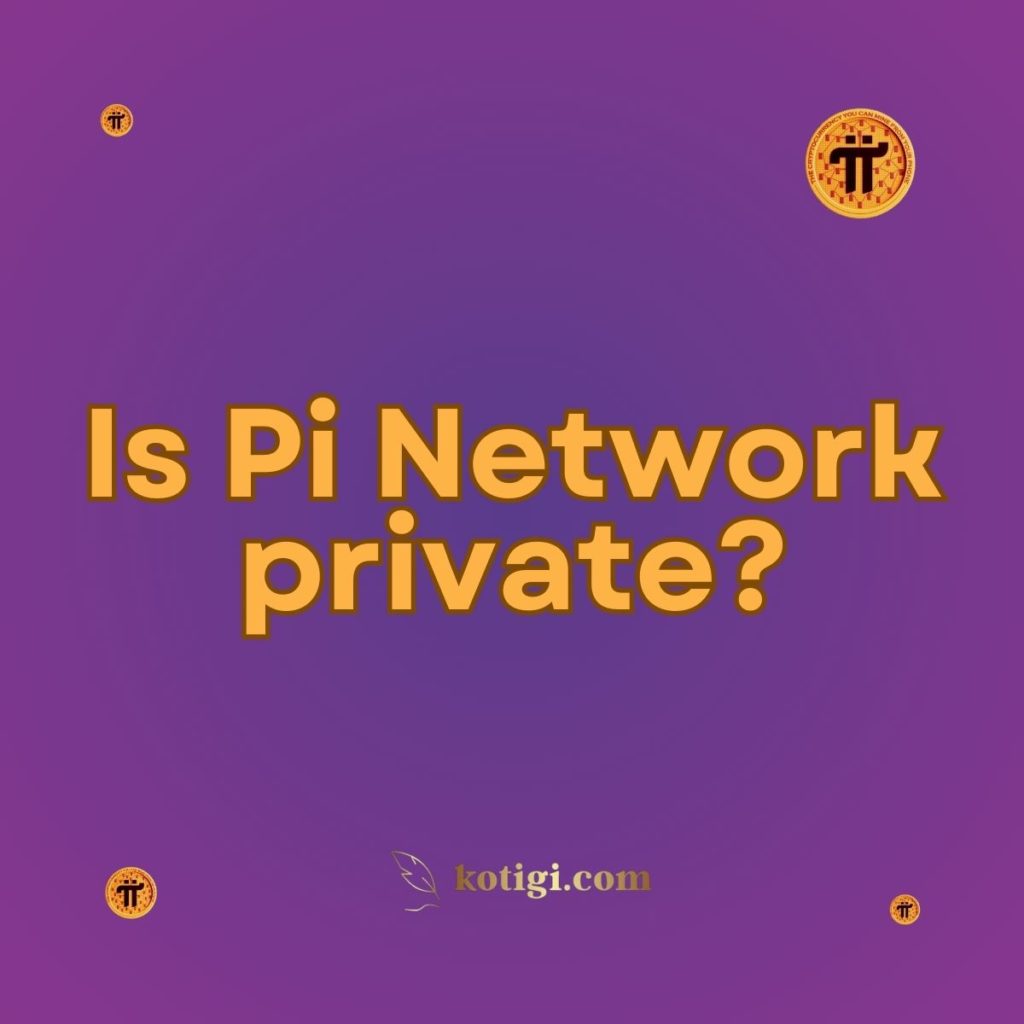
Is Pi Network private?
Pi Network is not entirely private due to its KYC requirements and the public nature of its blockchain transactions. While it takes steps to secure user data through encryption, users should remain aware of the potential privacy implications associated with their participation in the network.
Introduction
As more people become interested in Pi Network, questions about the platform’s privacy and security are natural. With an increasing focus on data privacy in the digital world, users are keen to understand how their personal information is handled, particularly in a decentralized cryptocurrency environment like Pi Network. This article explores whether Pi Network is private, the measures it has in place to protect user data, and how its privacy compares to other cryptocurrencies.
What is Pi Network?
Pi Network is a decentralized cryptocurrency project that allows users to mine Pi coins using their mobile phones. Unlike traditional cryptocurrencies like Bitcoin, which require energy-intensive mining processes, Pi Network seeks to make cryptocurrency mining more accessible and environmentally friendly.
Pi Network is still in its development phase and is not yet listed on public exchanges. The platform is driven by its large community of users, who verify transactions and secure the network through a consensus algorithm.
Key Components of Pi Network
- Mobile mining: Users can mine Pi coins on their mobile phones without draining battery or consuming significant energy.
- KYC verification: The Know Your Customer (KYC) process is required for users to participate in Pi Network’s ecosystem and secure their Pi coins during the transition to the mainnet.
- Decentralized model: Pi Network aims to establish a decentralized financial system, where users help maintain the security and integrity of the blockchain.
How Does Pi Network Handle User Data?
When it comes to privacy, understanding how a platform handles user data is crucial. Pi Network gathers several types of user data, including personal information during the KYC verification process and usage data through its mobile app.
What Data Does Pi Network Collect?
- Personal Identification Information:
During the KYC process, Pi Network requires users to submit personal documents, such as passports or driver’s licenses, to verify their identity. This step is essential for ensuring that users are real people and preventing fraud. - App Usage Data:
Like many other apps, Pi Network collects data related to how users interact with the platform. This includes information about device type, operating system, and usage patterns to help improve user experience and app performance. - Transaction Data:
Once the Pi Network reaches its mainnet phase, transaction data will be recorded on its blockchain. While blockchain transactions are typically transparent, they do not necessarily reveal personal details unless linked to specific user data.
How is User Data Protected?
Pi Network uses encryption and other security protocols to safeguard user data. For example, the personal data collected during the KYC process is encrypted to prevent unauthorized access. However, it’s important to note that Pi Network partners with third-party KYC providers to handle identity verification, meaning some user data is shared with external parties.
Pi Network’s app also uses secure connections to transmit data, and the development team continually works to improve the app’s security features. Still, users should be aware of potential vulnerabilities, especially when dealing with decentralized platforms where the security model may evolve over time.
Is Pi Network Truly Private?
The question of whether Pi Network is truly private depends on several factors, including the types of data collected and the measures in place to protect user information. While Pi Network does take steps to safeguard user data, it is not entirely private by nature.
KYC Process and Privacy Concerns
The KYC process, while necessary for preventing fraud and ensuring a secure network, raises privacy concerns for some users. To comply with regulatory standards, Pi Network requires users to submit sensitive personal documents. Although these documents are encrypted and handled by third-party providers, users must trust that their data will be stored securely and not misused.
Blockchain Transparency vs. Privacy
One of the core principles of blockchain technology is transparency. Once Pi Network reaches its mainnet, transaction data will be publicly accessible on the blockchain. While this enhances accountability and security, it also means that some level of privacy is compromised. Blockchain addresses, which represent wallets, can be linked to real-world identities if they are associated with personal information.
This transparency contrasts with the privacy-focused features of some other cryptocurrencies, like Monero or Zcash, which employ advanced cryptographic techniques to obscure transaction details.
Mobile App Privacy
Pi Network’s mobile app collects user data for functional and performance purposes. While this data is generally used to enhance the user experience, it adds another layer of concern for users who prioritize privacy. The app collects information about device type, operating system, and user interaction, which could potentially be linked to individual users.
Comparing Pi Network’s Privacy with Other Cryptocurrencies
Pi Network’s approach to privacy can be compared to other cryptocurrencies to give users a better understanding of where it stands.
Pi Network vs. Bitcoin
Bitcoin, like Pi Network, is built on a transparent blockchain where all transactions are public. However, Bitcoin users are not required to undergo KYC verification unless they are using exchanges or other third-party services. This means that, in theory, Bitcoin can offer more privacy than Pi Network, especially for users who take precautions to anonymize their transactions.
Pi Network vs. Privacy Coins (Monero, Zcash)
Privacy coins such as Monero and Zcash are designed to offer enhanced privacy features. Monero uses ring signatures and stealth addresses to ensure that transactions cannot be traced back to users. Zcash, on the other hand, allows users to choose between transparent and shielded transactions, with the latter providing complete privacy.
Compared to these privacy-focused cryptocurrencies, Pi Network offers far less anonymity. Its KYC process and transaction transparency on the blockchain make it more similar to Bitcoin or Ethereum, which prioritize transparency over privacy.
How Can Pi Users Enhance Their Privacy?
While Pi Network itself may not be a privacy-first cryptocurrency, users can take steps to enhance their own privacy while using the platform.
Protecting Personal Information During KYC
When participating in the KYC process, users should ensure they are using secure, trusted devices and internet connections. Avoid using public Wi-Fi or shared devices when submitting sensitive information, and be cautious about phishing attempts or fake KYC websites.
Using a Secure Wallet (Post-Mainnet)
Once Pi Network reaches its mainnet, users will be able to transfer their Pi coins to secure, external wallets. By choosing a hardware wallet, users can reduce the risks associated with keeping their funds on a mobile app and further protect their personal data.
Limiting Data Sharing
Pi Network users should regularly review the app’s privacy settings and limit the amount of data they share through the platform. This includes being mindful of permissions granted to the Pi app, such as access to location data or contacts, which may not be necessary for mining Pi.
What Are the Risks of Using Pi Network?
Despite its efforts to secure user data, there are some risks associated with using Pi Network, particularly in terms of privacy.
Data Breaches
As with any online platform, there is always the risk of a data breach. If Pi Network or its third-party KYC providers are compromised, users’ personal information could be exposed. While encryption and security protocols reduce this risk, no system is entirely foolproof.
Regulatory Compliance
Pi Network operates in multiple countries, each with its own regulations around data privacy and cryptocurrency. Depending on the jurisdiction, users may be required to share more personal information with the platform, and government agencies may have the ability to request access to that data.
Blockchain Exposure
As Pi Network transitions to its mainnet, users must be aware that blockchain transactions are public. While personal details are not directly recorded on the blockchain, patterns of transactions or wallet addresses could be linked back to real-world identities, especially if combined with KYC data.
Conclusion
Pi Network provides a platform for users to engage in cryptocurrency mining with minimal technical expertise, but its privacy model is not as robust as some privacy-focused cryptocurrencies. While the platform employs security measures to protect user data, including encryption and third-party KYC services, Pi Network users must accept a degree of transparency due to its blockchain-based nature and KYC requirements. Those concerned about privacy can take steps to safeguard their personal information and make informed decisions about how much data they share.
Key Takeaways:
- Pi Network requires personal data for KYC verification, which raises privacy concerns for some users.
- Blockchain transparency means that transaction data will be publicly accessible once Pi Network reaches its mainnet, potentially exposing some level of user information.
- Compared to privacy coins like Monero and Zcash, Pi Network offers far less anonymity.
- Users can enhance privacy by taking precautions during the KYC process, using secure wallets post-mainnet, and limiting data sharing through the Pi app.
- There are risks associated with using Pi Network, including potential data breaches and exposure to regulatory scrutiny.





